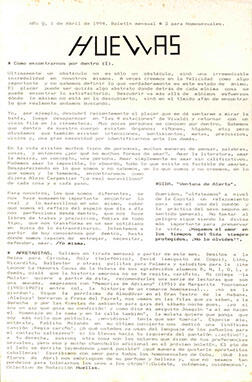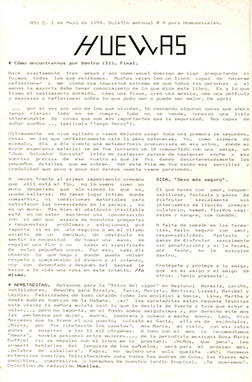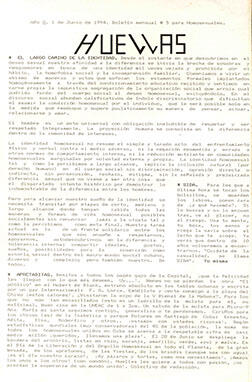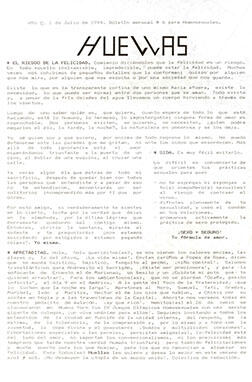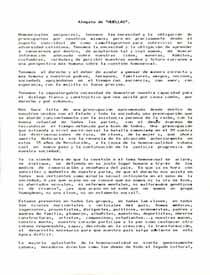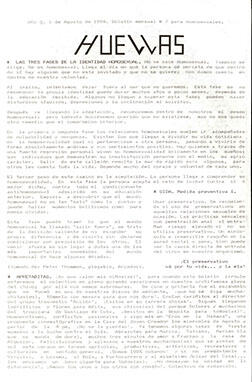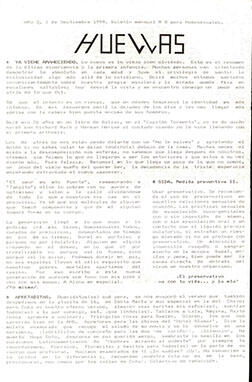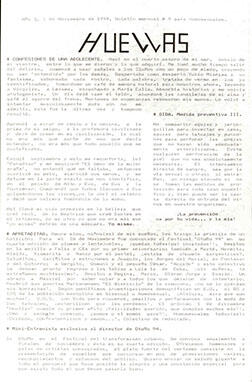Identity area
Reference code
Title
Date(s)
- c.1993-c.1996 (Creation)
Level of description
Extent and medium
2 folders
Context area
Name of creator
Administrative history
The Cuban Association of Homosexuals and Lesbians was an independent organization that fought for the unification and social recognition of LGBTI+ and HIV-positive people throughout the 90s in Cuba. Two of its known accomplishments were the publication of the clandestine newsletter “Huellas” (1993-c.1996) and the public reading of the organization's manifesto on July 1994.
The organization was based in Havana and was led by Andrix Gudin Williams. Another of its members, Jorge Flores, was interviewed by the gay U.S. magazine “The Advocate” and stated: “The government will never permit a gay organization in Cuba […] A small minority of the group wanted the project to go ahead, but the majority had an enormous fear-a fear that only gay Cubans can feel. I certainly don't want to be the leader, because they will cut my head off. You see, I don't mince words: They will cut my head off."
The Manifesto of the ACHL was published in English by gay Canadian historian Ian Lumsden in his book “Machos, maricones and gays: Cuba and homosexuality”. According to Lumsden’s transcription, the manifesto was publically read on July 28, 1994 at 5:00 P.M. at Almendares Park. It calls upon listeners to remember those who were discriminated for their gender expression and sexuality since the U.M.A.P. camps; it highlights the importance of making laws to fight homophobia and serophobia; and asserts that the state should not make moral judgements, only juridical ones.
The ACHL dissolved few years after and some of its members joined the Action Group for Free Expression of Sexual Choice or G.A.L.E.E.S. (original Spanish acronym).
Name of creator
Administrative history
G.A.L.E.E.S. (Spanish acronym: Action Group for Free Expression of Sexual Choice) was an independent organization founded in Havana around 1996 dedicated to fighting homophobia and promoting sexual liberation. Their main strategy to achieve these goals was designing and coordinating activities. Its members, some belonging to the Gay and Lesbian Association of Cuba (Asociación Cubana de Homosexuales y Lesbianas or ACHL), led the group through a Board of Directors with a parallel leadership structure. Its principal members were José Enrique Pineda, Jorge Luis Torres, Lizbet Gispert, Amaury Fernández, [Odaymar] Cuesta and Joel Feal. G.A.L.E.E.S. took a critical stance against the official rhetoric, refuting the argument that marginalized communities were already integrated into, and respected by, Cuban society. Additionally, the group advocated for spaces dedicated to “sexual minorities,” arguing that their purpose was not to create divisions, but rather to include and empower those who felt excluded because of their sexual identity.
Repository
Archival history
During the mid-nineties, Salvador who was in charge of Huellas, entrusted these documents to British activist Stephanie Davies who was visiting the island with the Queers for Cuba group. In August 2020, Librada González Fernández met with José Pineda, ex-general coordinator of G.A.L.E.E.S. and he put her in contact with Stephanie Davies who donated this collection to Cubanecuir two months later.
Immediate source of acquisition or transfer
Donated by Stephanie Davies to Archivo Cubanecuir
Received October 22, 2020
Content and structure area
Scope and content
Records created by two Havana-based queer organizations during the 90's: fifteen issues of Huellas, the newsletter of the Cuban Association of Homosexuals and Lesbians (original Spanish acronym: ACHL) and a pamphlet about the Action Group for Free Expression of Sexual Choice (original Spanish acronym: G.A.L.E.E.S.).
Huellas focuses on topics such as queer Cuban identity, civil rights, education, health and culture during the last decade of the XX century. The issues available here were published between 1993-1996 and make-up what its authors call “the first publication to genuinely come from the scene, edited by and for entendidos” In other words, Huellas is the earliest surviving independent publication edited for and by openly queer people in Cuba.
Also included in this collection is a pamphlet detailing the mission, purpose, and leadership structure of G.A.L.E.E.S., an organization which included members from the ACHL after the latter dissolved.
To understand the importance of these documents, it is necessary to consider the difficulties of creating and circulating clandestine materials about 90’s homosexual/queer culture in Cuba. In 1993, the most thorough and government-approved reference to the subject was the recently premiered movie Strawberry and Chocolate (original Spanish title: Fresa y Chocolate) based on a story by Senel Paz. Existing social spaces for LGBTQ+ people (such as parties and nightclubs) were outlawed and especially those with sociopolitical ends. G.A.L.E.E.S. and especially the ACHL spread their ideas through publications that, according to the State’s monopoly of media in Cuba, were illegal.
Possibly this explains why the editorial team behind Huellas remained anonymous until the publication of issue # 21. They identified themselves as “Carlos, Salvador, Ivonne, Ricardo, Pedro (the Huellas five)”. None of them used their last name, but it is possible to assume that Pedro is the same Pedro Praderas that signed under the section titled “Nuestra canción” in issue # 21. It is also possible to associate Ivonne, the only traditionally feminine name, with the sections written under the pen name “Yo misma” (Myself). However, since according to issue # 13, “Yo Misma” retired after the prior issue, it is possible that the pen name was used by more than one person. Finally, the donor of this collection states that Salvador was the leader of the publication and who entrusted her with these copies so that they could be preserved.
The members of the ACHL understood the risks associated with participating in a clandestine organization. One of them, Jorge Flores, was quoted by the gay U.S. magazine The Advocate as saying: “The government will never permit a gay organization in Cuba […] A small minority of the group wanted the project to go ahead, but the majority had an enormous fear-a fear that only gay Cubans can feel. I certainly don't want to be the leader, because they will cut my head off. You see, I don't mince words: They will cut my head off."
The newsletter was first distributed on a trimonthly basis beginning December 1st, 1993. Out of the fifteen issues available here, only the first two are explicitly affiliated with the ACHL. After the second issue, the newsletter was distributed monthly and all references to the organization disappeared.
The last section of every issue, entitled Apretaditas (which can be translated to “Tight Ones”) offers the readers an authentic glimpse at the queer world of the time through personal messages, funny commentary, and brief news for and about queer/homosexual folks in Havana.
Appraisal, destruction and scheduling
Accruals
System of arrangement
Arranged based on record creator and in chronological order when possible.
Conditions of access and use area
Conditions governing access
Open for research
Conditions governing reproduction
Copyright undetermined.
For more information contact Archivo Cubanecuir.
Language of material
- Spanish
Script of material
Language and script notes
Physical characteristics and technical requirements
Finding aids
Generated finding aid
Allied materials area
Existence and location of originals
Existence and location of copies
Related units of description
Publication note
More information on the Gay and Lesbian Association of Cuba (pp. 197–198) including a public manifesto by the organization (Appendix C):
Lumsden, I. (1996). Machos, maricones, and gays: Cuba and Homosexuality. Temple University Press. https://doi.org/10.3362/9781899365852
Another documentary on gay and lesbian life in Havana during the Special Period. Includes many interviews with members of G.A.L.E.E.S. and more interviews with some of the subjects from the 1993 documentary Looking for a Space:
De Vries, S., Centro Félix Varela, & Frameline (Firm). (1995). Gay Cuba. Frameline.
Notes area
Alternative identifier(s)
Access points
Subject access points
Name access points
Genre access points
Description control area
Description identifier
Institution identifier
Rules and/or conventions used
International Standard Archival Description by the International Council on Archives
Status
Level of detail
Dates of creation revision deletion
Description prepared by Librada González Fernández, January 2025
Language(s)
- English
- Spanish
Script(s)
Sources
[1] Huellas: Año 1. 1 de diciembre de 1994. Boletín mensual # 10 para Homosexuales
[2] Bull, C., & Morales, J. (1995, January 24). Crisis in Cuba. The Advocate, 672/673, 49. [Read]

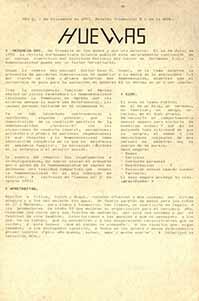
![Año 0. 1 de marzo de 199[4]. Boletín trimestral # 2 de la ACHL](/uploads/r/archivo-cubanecuir/d/b/e/dbe3577a448810129de075b204a8ffe3bf3996bbbc1d1ecf0dc93f5ebe0ea0e7/Huellas_2_thumbnail.jpg)
